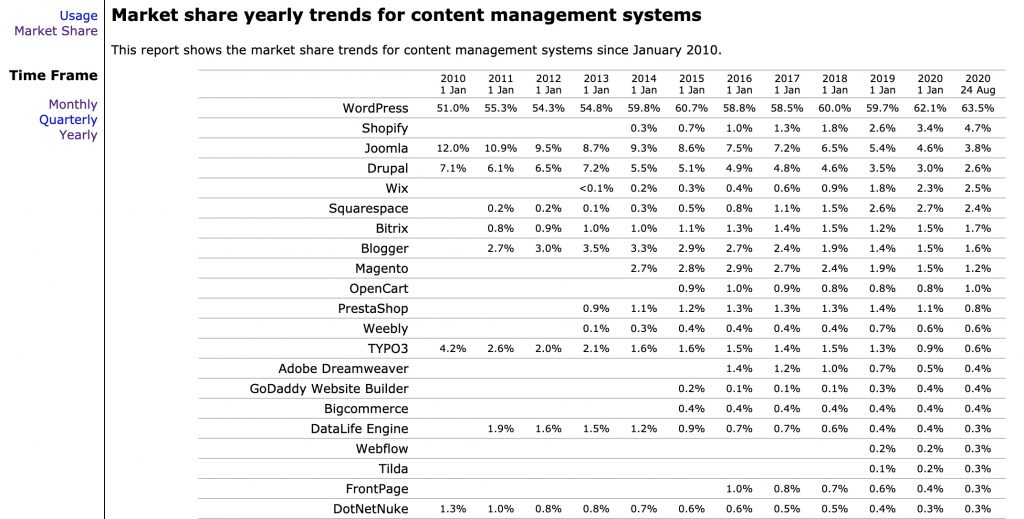A blog might not be new terminology for you all, so let’s quickly understand what a blog is. A blog is mainly a web page that needs to be updated regularly with fresh content that interests readers. Content may be motivational, educational, recipes, and how-to articles. But what is a blog used for, and how should it be used? We will learn these things in this article.
A blog can have diverse purposes, such as creating awareness about a particular brand or an individual need, promoting a business, or increasing sales—the list goes on and on. Blogs may be of various types, such as fashion blogs, food blogs, travel blogs, music blogs, lifestyle blogs, fitness blogs, DIY blogs, and sports blogs.
What is a blog?
History of the blog

The world’s first blog, Justin’s Link (links.net), was created by Justin Hall in 1994. He was a student at Swarthmore College. The term blog didn’t exist then, so it was considered a personal homepage.
Weblog to blog
The term weblog (the weblogging process) was first used in 1997 by Jorn Barger.
The programmer Peter Merholz truncated the word “weblog” to “blog” in 1999 and became the coiner of the word “blog.”
About Blog
A blog is an online platform where bloggers can share their thoughts and opinions on diverse topics. Blogging is the art of storytelling. An excellent blog will contain all the contents that tell an informational story to the readers. A simple tech blog can communicate clarity and seriousness, whereas a cartoonish, funny blog will communicate fun and excitement.
A blog can be anything you want it to be, but remember that it should enchant readers with a friendly tone.
What is a niche blog?
A Blog written about a personal interest or topic is a niche blog. A niche blog may be as follows-
Travel Blog
A travel blog will stress your personal traveling experiences filled with immense hunt and treasure. People will enjoy reading as everyone loves traveling around the world.
Healthcare Blog
Health blogs also offer excellent opportunities to write about fitness activities, exercise, diet, food supplements, etc. These can drive high traffic and generate income.
Parenting Blog
Parenting blogs are one of those niches that will always drive traffic and money as there are various topics related to babies’ foods, safe toys, clothing, fun-frolic activities for children, etc.
Lifestyle Blog
A lifestyle blog is where the author documents his experiences, interests, hobbies, and talents on a particular topic. It covers multiple areas of a writer’s interests rather than only one.
For example, a lifestyle blog may cover fashion, fitness, travel, health, and relationships. A lifestyle blog can be a sort of a person’s diary, a kind of writer’s interest, or a biography in simpler terms.
Successful professional and personal bloggers are making money through advertisements and sponsorships.
What is a blog post?
A blog post is a kind of article you write on a blog. It includes content in any form, be it text, photo, video, infographic, etc. A blog post is a web page containing information about a particular topic and includes the subtopic. The title of a blog should be eye-catching and attention-grabbing. It is essential to know what a blog is used for and how to blog.
Blogging for business

For example, you have started a food blog on your restaurant website, and let’s say the title of one blog post might be “10 best Italian recipes.” The overall exposure to the topic is food, but it also addresses a sub-topic, “best Italian recipes.”
Blog posts rank on search engine result pages using different keywords. If you write a blog post about the best Italian recipes, it will rank on similar keywords. When people search “Italian recipes” or “best Italian recipes,” they will reach your blog post. After that, they may access the entire website.
Blog posts help readers check your food menu or other recipes you cook and serve. They can drive traffic to your website through blog posts and encourage users to visit your food restaurant.
Benefits of blogging for business
There are various benefits of blogging for business. Some of them are given below:
- Driving traffic to your website.
- Traffic can be converted into leads to generate income.
- Build authority in the business world.
- Keep growing business online and offline.
- Convert blog readers into customers.
These key points will help you if you want to start your blog. They will give you insights about how to become a successful blogger.
Blog vs. website
Nowadays, business websites have blogs to raise awareness about their products and services. It should be clear that any website can’t be a part of a blog.
A blog needs regular updates frequently by adding new and fresh content every time, but a website does not.
Blogs allow two-way communication by engaging audiences by interacting with them through comments, views, or sharing your posts further. Still, a website is a static and one-way communication channel.
However, a blog can become a website if anyone uses it for personal use by sharing their thoughts and views alone, for instance, a parenting blog or a travel blog.
Difference between blog and wiki
A wiki is a place where visitors can make modifications, i.e., edit, update, or publish content. We all know about Wikipedia. Many of us only read it, but thousands of contributors edit and publish content in different languages.
Only a person or team can run a blog with permission to publish, update, and edit content. Website visitors can only write comments at the bottom of the blog post but can not publish or edit blog posts.
A blog involves writing opinions, thoughts, or views, whereas a wiki shares content that is constantly updated according to recent happenings.
The blog displays new content daily, weekly, or monthly, whereas the wiki evolves the same content over time.
We create a blog to communicate with the audiences, whereas the purpose of a wiki is to get work done or to work together.
What is a blog used for?

1. Rank your business website on search engines
Nowadays, it is recommended to have a blog on your business website to get better search engine rankings. Traditionally, businesses use paid ads to rank their business web page, but incorporating a blog into a business website can be a long-term and effective method.
Suppose you are working with a startup and continuously writing and posting blogs about fashion design. Over time, this will help drive traffic, and other blogs can link to your blog posts as reference links. This will allow Google to recognize your business website as a valuable resource for fashion design information. Your posts will start ranking on Google SERPs for terms like “fashion design,” “fashion designer,” and “fashion shows.”
It is how your business will eventually start ranking on search engine result pages.
2. Become an expert in a niche
Blogs help share information by writing and posting content on the Internet. You never know; blogging can turn you into an expert one day.
Lifehacker
For instance, Lifehacker was launched in January 2005. They publish life hacks, tips, and tricks for their readers. They are also covering topics related to software and computer programming. Their readership is growing because tips and downloads offer value to readers. Thus, they are increasing productivity both at work and at play.
Yaro Starak
Another example blog is Yaro Starak’s. His objective in starting the first blog was to see the SEO results. He is also willing to discuss his business journey.
Now, people believe he is among the most versatile bloggers. He has two websites and teaches how to become a successful blogging entrepreneur. These two are blogging membership websites; only paid subscribers can get access.
A membership website can be a good source of income, and Yaro was teaching people “how he makes money from his membership website” in 2009.
He is one of the entrepreneurial blogging legends everyone must follow!
3. Convert visitors into leads

A business website does not fetch visitors from search engines because only existing customers browse your website. There are rarely new visitors to a business website’s home page or about us page. That’s why blogs are essential in the age of digital marketing.
If you post content related to the business they are choosing, your blog can help your website visitors.
For instance, if you sell products for fashion design online, blogging about fashion design and fashion technology can help your business. Publishing well-researched content will attract an audience to your blog, and you can convert these visitors into leads.
This way, you build up trust with them, and they will also check your product pages.
4. Build a community to engage your audience
An audience with the same interests can be easily engaged on a blog; this way, you build a community and get leads. For instance, you run a food blog and ask the audience to share their recipes and secrets with you. All these activities can lead to fun and excitement.
Similarly, if you start a fashion blog and showcase your designs, you can ask your audience to share their unique ideas and reward them. This blog will become a fun-frolic project that can help you to communicate, engage, and build trust with your audiences.
How to blog?

1. Define your target audience
While starting a blog, it is essential to define your target audience.
- What is your niche?
- Who will be the readers?
- Who will be the target audience?
Considering all these questions, you need to create content on a particular topic. You should be aware of why you want to include this content in your blog. This will help you determine which type of content suits the reader’s mind.
2. Well-researched content ideas
Blogs should continually be updated, and content should be new and fresh every time. Content creation is a complex task and consumes much time and energy. I am sure you will always want your content to not compromise with the quality; it should be SEO-friendly, and it should be such that it enchants readers’ minds.
You must always look at your competitor’s content for well-researched content ideas. Always try to take advantage of content gaps and write your content accordingly. Don’t forget to do SEO research and choose the most searched topics on Google. It will verify that you produce content that will bring traffic to your website.
Tools like Google Keyword Planner, KWfinder, SEMRush, Ahrefs, and Answer the Public can significantly help you.
3. Choose the suitable CMS
The best content management platform (CMS) is essential for blog hosting. Using a content management system, you can design, manage, and publish your blog. The most used content management systems (CMS) are WordPress, Wix, Squarespace, Blogspot (Blogger), Joomla, Drupal, Ghost, etc.
Most people use WordPress, and its market share is 63.5% in 2020.

If you are in the mood to do blogging, then first verify whether CMS has all the capabilities to host an SEO-friendly blog. If not, then review CMS by integrating options into your website.
You can always switch to a different CMS to run your website and blog on the same platform for easy content management.
We recommend WordPress because it is open-source software, a variety of plugins and themes are available to match your requirements, there is a large support community, and thousands of experts are available 24/7 to help you.
4. Have a blog strategy
Every business needs a strategy; in the same way, you need to plan a blog strategy to become a successful blogger. Your blog strategy should fulfill specific answers to the questions like:
- Who is your target audience?
- Which niche are you going to choose?
- Which CMS are you going to work with?
- What will be your blog posting schedule?
You should have a goal, mission, vision, and objective for your blog.
You must create an editorial calendar for your blog. It will help you track upcoming posts, ensure that content writers are meeting deadlines, and cross-check that you have sufficient content ideas for future posts.
5. Article structure is important
It is essential to pay attention to the article’s structure or format. The format of your post should be proper and well-structured.
It should contain necessary breaks when needed. It should have proper headings, sub-headings, bullets, and numberings for points, images, infographics, etc.
In short, it should be appropriately structured so that readers like and scan it within a few minutes and can land on the desired section of the article.
Never forget to use a call to action (CTA), which tells readers what to do next. This can help you generate leads and make money from your blog.

6. Learn marketing to promote your blog
Marketing and promotion are among the most important aspects of your blog. Have you ever noticed a classroom without students and a teacher standing and uttering alone?
Do you ever see a theatre show without an audience? How would you feel when you perform on a stage without anyone to appraise or applaud you? Will you feel good? The answer to it is a big NO.
Similarly, if you write a blog and nobody reads it, it will surely hurt your brand or company. That is why marketing and blog promotion is essential. You can use SEO, social media, newsletters, and ad campaigns to promote your blog.
7. Learn and do SEO
If you want to become a successful blogger and attract readers (organic traffic) to your blog, you’ll have to learn SEO techniques, such as keyword research, to rank on search engine result pages.
8. Try different blog post styles
Your blog post style should be exceptional, eye-catching, and attention-grabbing because influenced readers can be converted to leads.
If your blog post style is exciting and attractive, then it will indeed be read by followers and individuals. Never bore your readers.
Use a wide variety of styles to avoid becoming outdated and obsolete. There are different blog styles- how-to posts, list-based posts, thought leadership, etc.
9. Update old content
Producing new and updated content is not an easy task every time. You don’t have to innovate something new every time. You can also update old posts and add value to keep them updated with time. What you can do is recreate old content and post it after every week or month.
Creating old content from your YouTube video or podcast can greatly help you create a new one. You can also embed these videos and podcasts into this content.
10. Perform a competitor analysis
You must always perform a competitor analysis to analyze your competition. It will help you to understand new trends, create new content, update an old one, or bridge the content gap to grow your blog.
Competitive analysis always helps to build a perfect blog strategy. By competitor analysis, you know the weak areas of your competitor’s blog post.
You can plan unique post styles you need to follow. With the help of competitive analysis, you will get insights into the competitor’s post, and accordingly, you could create the best content by going through it.
Co-author: Ms. Manpreet Kaur, BEd

Great post! Very helpful to newbies. It gave me some new perspectives and other things to dig into deeper.
Thank you
Crissy C
Always welcome Crissy!